I’ve always been fascinated by jungle cats. But then I found the Chausie. This exotic cat is a mix of the jungle cat Felis chaus and domesticated cats like the Abyssinian. It’s a cat that looks wild but acts like a loyal pet.
The Chausie’s journey started in 1990. Breeders combined these two types, creating a new hybrid. By 2013, the Chausie was recognized as a full domestic breed by TICA.
Chausies are not just beautiful. They’re also smart and full of energy. They love to solve problems and stay close to their humans. Whether you’re new to cats or have had many, the Chausie offers a special connection.
Chausie Cat Breed
The Chausie cat is a unique hybrid, blending wild and domestic traits. It mixes jungle cat genes with those of Abyssinian and domestic shorthair cats. This mix gives them a muscular build and an alert look, but they’re also very affectionate and social.
Uniqueness Of Chausie Cats
Chausie cats have a lean, athletic body and a strong instinct to hunt. They need lots of play and mental challenges. Their diet must be high in protein to keep their digestive system healthy. Their coats show unique grizzled patterns, often in black or brown.
The Meaning Behind the Name “Chausie”
The name “Chausie” comes from Felis chaus, the jungle cat’s scientific name. It’s pronounced “chow-see” and celebrates their wild heritage. Their tabby patterns help them blend into their surroundings, making them stand out.
Where Chausie Cats Stand in the Cat Breed Hierarchy
Chausies are considered non-domestic hybrids. They were recognized by TICA in 1995 and became champions in 2013. They’re among the rarest domestic hybrids, with only a few hundred kittens born each year. Here are their TICA milestones:
| Year | Achievement |
|---|---|
| 1995 | Recognized as domestic breed by TICA |
| 2013 | Granted championship status |
Even though they’re hybrids, Chausies are fully domestic in nature by the fourth generation. They’re not ideal for first-time cat owners because of their high energy.
The Fascinating History and Origin of Chausies
Wild cat hybrids like the Chausie come from ancient Egypt. There, jungle cats were highly valued. Mummified remains show these wild cats lived with humans over 4,000 years ago.
In the late 20th century, breeders wanted to mix jungle cat’s wild looks with domestic traits. The first mix of a jungle cat and a domestic shorthair was in 1990. By 1995, The International Cat Association (TICA) saw the Chausie as a foundation breed.
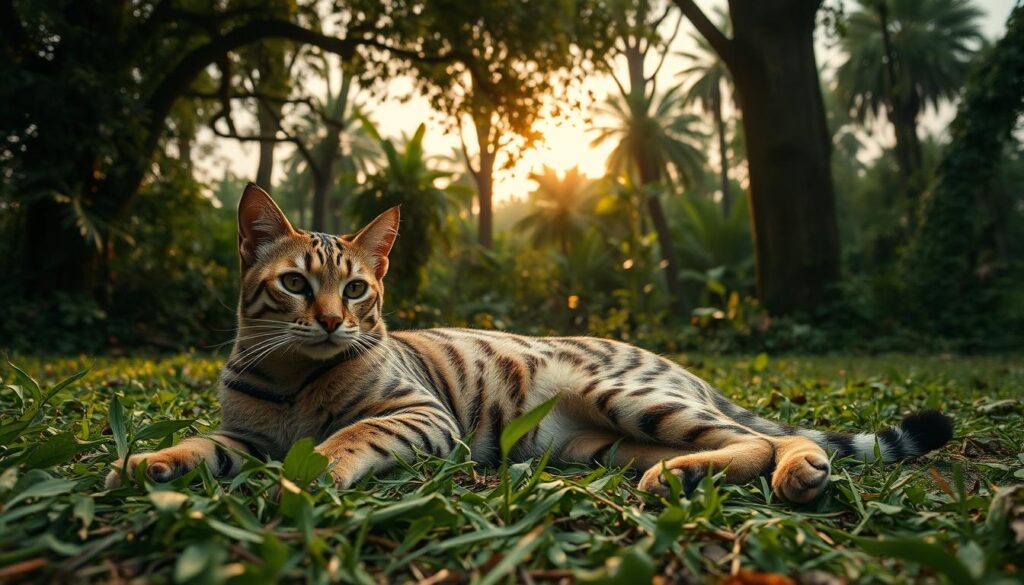
After years of careful breeding, TICA gave the breed full championship status in 2013.
- 1990: First intentional Jungle Cat × domestic cat breeding
- 1995: TICA grants foundation registration
- 2002: Achieves evaluation status
- 2003: Advanced New Breed status awarded
- 2013: Full championship recognition
Breeders aimed to keep the Chausie’s striking looks and friendly nature. Today, Chausies are a rare breed. They need careful breeding to keep their special heritage and health.
Their history shows a long bond between humans and wild animals. Now, they are recognized as loving pets.
Physical Characteristics and Appearance
Chausie cats are sleek and athletic. They are medium-sized, blending wild looks with a domestic feel. Their build shows their jungle roots, with power and agility combined.
They come in different sizes. Males weigh 15–25 pounds, and females weigh 12–18 pounds. They stand 14–15 inches tall, with long bodies and legs. This makes them look tall and elegant.
Despite their wild look, they are friendly at home. Their size fits well with their friendly nature.
Coat details show three patterns: solid black, grizzled tabby, and ticked tabby. The grizzled pattern has a wild look. The ticked tabby looks like an Abyssinian. Their short coat needs only weekly brushing to stay clean.
- Distinctive features: Tall, broad ears and almond-shaped eyes that can be gold or green. They also have high cheekbones.
- Body structure: They have a deep chest for endurance and strong limbs. Their body is built for running. Their hind legs are a bit longer, helping them jump up to 6 feet.
Chausie cats are not big but are very athletic. They are agile, even in a home. Their wild look and manageable size make them beautiful and friendly pets.
Temperament and Personality Traits of the Chausie
Chausie cats mix wild charm with domestic traits, making them stand out. These intelligent cat and playful cat hybrids love to interact, like dogs. They are perfect for families who enjoy being active.
Intelligence and Problem-Solving Abilities
Chausies come from jungle cats and Abyssinians, so they’re very smart. They can learn tricks, open cabinets, and solve puzzles. Their curiosity keeps them busy, so owners need to keep them mentally stimulated.
Training them with treats and praise helps them shine in agility. This makes them great at competitions.
Loyalty and Bonding with Owners
Chausies bond strongly with their families. They often pick a favorite person but are friendly with others. They greet you at the door and join in daily activities.
Early socialization makes them confident and loving. But, rehoming can hurt their trust. They talk a lot, always wanting to be with you.
Playfulness and Energy Levels
Chausies are full of energy and love to play. They enjoy games, walks, and climbing. They need lots of space to stay active.
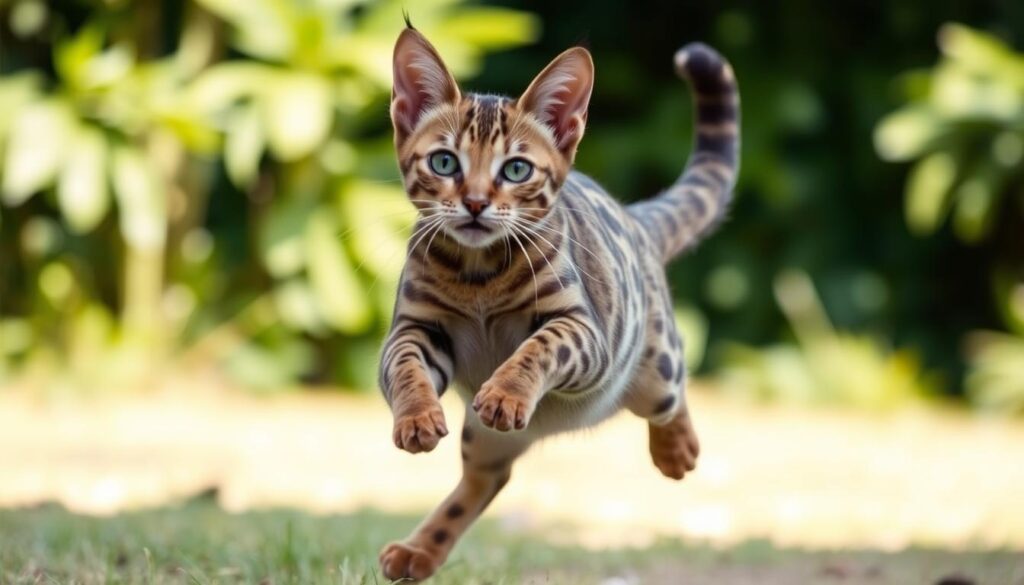
If they don’t get enough exercise, they might get destructive. They’re perfect for families who love to stay active.
Are Chausie Cats Truly Hypoallergenic?
Many people wonder if Chausies are hypoallergenic cats. To answer this, we need to understand allergies. Allergies come from proteins in a cat’s dander, saliva, and urine, not just fur. Chausies have short, low-shedding coats, which means they spread fewer allergens than long-haired cats.
They shed moderately, which means less hair on furniture and carpets. This makes their living spaces cleaner, which is good for people with allergies. But, how you react can vary. It’s best to visit a breeder and spend time with a Chausie before adopting.
Managing allergens with a Chausie involves some steps:
- Use HEPA air purifiers to filter airborne allergens
- Brush weekly to minimize loose fur and dander
- Create allergen-free zones like bedrooms by banning cats from certain areas
Remember, “hypoallergenic” is a relative term. Chausies do produce allergens, just like any cat. If you’re allergic, talk to an allergist first. They can help you decide if a Chausie is right for you.
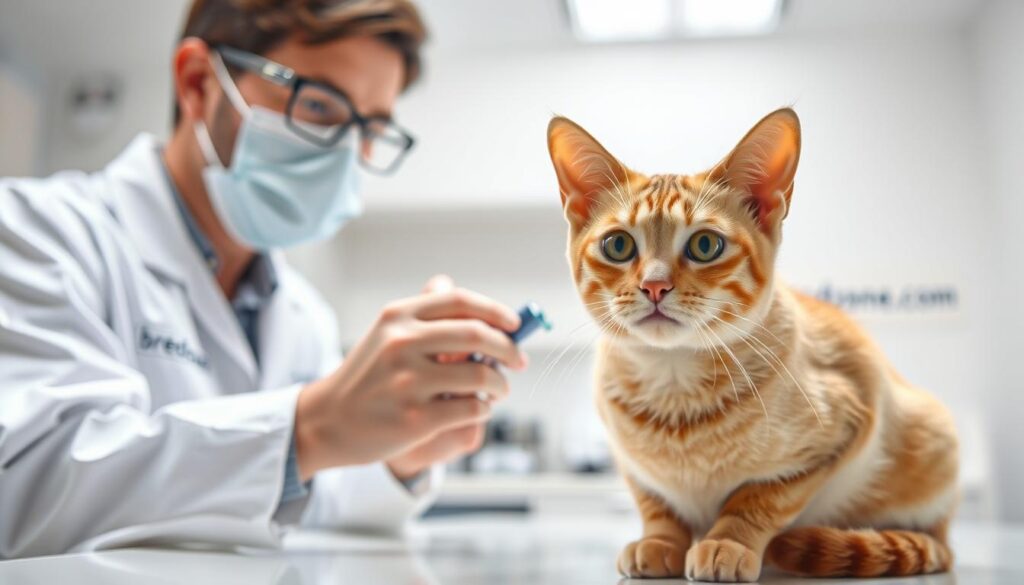
Daily Care Requirements for Your Exotic Companion
Keeping your Chausie healthy and happy is key. These pet cats love routines that remind them of the wild. Start with their diet—choose high-protein, grain-free wet food. This matches their jungle roots.
Stay away from veggies and grains to avoid stomach problems. Their sensitive stomachs are similar to those of jungle cats.
- Feeding: Serve twice-daily portions of premium canned food. Consult your vet about raw diets.
- Hydration: Provide fresh water daily to support their active metabolism.
Grooming is easy: brush them weekly to keep their short coat in check. Trim nails monthly and clean teeth with vet-approved products. They don’t shed much, but regular ear checks are important to prevent infections.
They need lots of exercise. These cats are like athletes. Install tall cat trees and interactive toys. Daily play with feather wands or puzzle feeders keeps them sharp. They can jump up to eight feet, so a climbing tower is a must.
| Care Area | Key Tips |
|---|---|
| Diet | High-protein, low-carb wet food. Avoid grains. |
| Grooming | Weekly brushing, monthly nail trims, dental care. |
| Exercise | Interactive toys, daily play, vertical spaces. |
Chausies are smart and need things to do. Puzzle toys or treat dispensers are great. They love people and get bored if they don’t play. With the right care, they become great friends ready for any adventure.
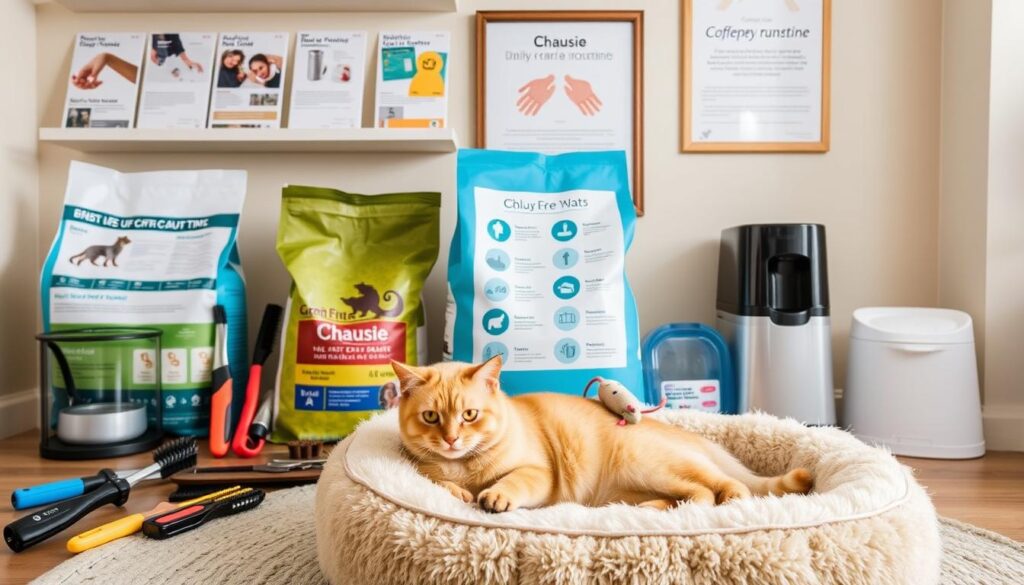
Health Considerations and Common Medical Issues
As a chausie cat owner, it’s key to know their health needs. Their wild roots bring both benefits and risks.
Genetic Predispositions
Chausie cats get traits from their jungle cat ancestors. One is a shorter intestinal tract. This can lead to digestive issues if they eat too much plant-based food. They are at risk for:
- Inflammatory bowel disease (IBD) from bad nutrition
- Irritable bowel syndrome (IBS)
- Food sensitivities needing special diets
Lifespan Expectations
With good care, chausie cats can live 12–15 years. Their life span depends on:
| Factor | Impact |
|---|---|
| Genetic health screening | Reduces inherited disease risks |
| Consistent vet care | Early detection of cardiac or gastrointestinal issues |
| Activity levels | Prevents obesity-related health decline |
Preventative Care Recommendations
Regular vet visits are a must. Here’s what to do:
- Choose a vet who knows hybrid breeds
- Feed a meat-based diet, avoiding carbs
- Do annual fecal exams for parasites
- Check for heart murmurs with yearly echocardiograms
Vaccinations are safe, but their effectiveness is unsure. Focus on parasite prevention and heart health tests.
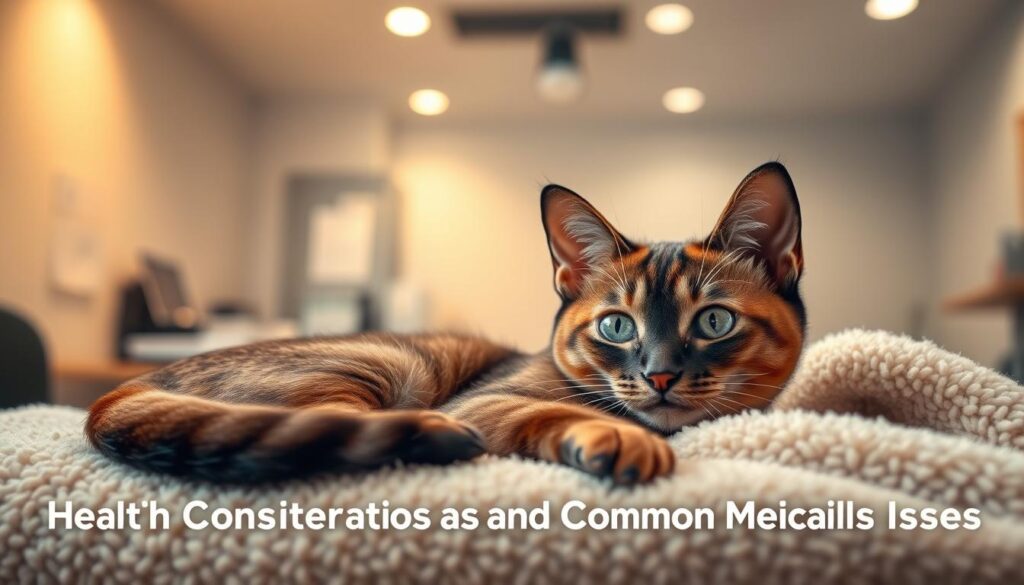
Living with a Wild Cat Hybrid: Home Environment Needs
Getting a wild cat hybrid like the Chausie means setting up a special home. Their jungle cat roots mean regular homes aren’t enough. They can jump six feet high, so you’ll need to keep things safe.
They love to climb, so your walls should have cat trees or shelves. This lets them explore and play.
- Secure cabinets with child-proof latches—Chausies can open drawers and doors
- Remove toxic plants like lilies and store medications in locked containers
- Install window guards to prevent escapes from high perches
They need lots of vertical space. A 7-foot cat tree with many levels is perfect for them. Window perches let them watch birds without getting too close.
They have strong jaws, so they can damage furniture. You’ll need tough scratch posts. Puzzle toys keep their minds sharp and stop them from chewing or scratching too much.
They also need good health care. Because regular vaccines might not work for them, see a feline expert. They need lots of playtime with feather wands or laser pointers. Without enough play, they might get anxious and spray or meow too much.
Is the Chausie the Right Cat Breed for Your Family?
Thinking about getting a Chausie cat? They mix wild and tame traits, making them special pets. They need lots of play and attention. Make sure their needs match your family’s lifestyle.
Compatibility with Children
Chausies love to play and are great for families. They enjoy games like fetch and chase. But, they’re big and strong, so watch them around little kids.
Teach kids to play gently with the cat. This way, everyone stays safe. Chausies are best for families with older kids.
Interactions with Other Pets
- Chausies get along well with cats and dogs if they grow up together.
- Having another cat can keep them company when you’re not home.
- Introduce new pets slowly, using scent swapping and neutral areas.
Space and Lifestyle Considerations
Chausies need tall places to climb and play. They do well in apartments if you play with them often. They need 2–3 hours of play and brain games every day.

They’re smart and can get into trouble if bored. They might open cabinets. So, keep them busy and happy.
| Factor | Requirement |
|---|---|
| Living Space | Vertical climbing areas + 1–2 play sessions daily |
| Companionship | Another pet recommended if owner is away >4 hours daily |
| Time Commitment | Interactive play, training, and enrichment essential |
Chausies are perfect pets for families that can give them the care they need. They are loyal and full of energy. But, they have wild sides that need attention. Think about your schedule, space, and family before bringing one home.
Finding and Adopting a Chausie: What You Need to Know
Adopting a Chausie, an exotic cat breed, requires careful research. These rare cats need a thorough check of their origin to ensure their health and happiness. Start by understanding your options and preparing for their unique needs.
Reputable Breeders vs. Rescues
Most Chausies come from breeders because they are rare. Look for breeders certified by TICA, the International Cat Association, which first recognized them in 1995. Reputable breeders offer health clearances and socialization training. Kittens should have first vaccinations but need yearly vet visits. Prices range from $1,000 to $2,500. Rescue options are limited, so sign up for updates with organizations specializing in hybrid cats.
| Key Criteria | Reputable Breeders | Rescues |
|---|---|---|
| Health Records | Required | Rarely available |
| Cost | $1,000–$2,500 | Varies by case |
| Availability | Common | Scarce |
Questions to Ask Before Adoption
- What health tests were performed on the parents?
- Can I meet the parents?
- What vaccinations have been given?
- Do you offer a health guarantee?
- What diet and grooming routine do you recommend?
Initial Adjustment Period Expectations
Chausies may take 2–4 weeks to settle. Create a calm environment with a safe room, familiar toys, and a consistent feeding schedule. Expect them to hide or be shy initially. Gradually introduce family members and other pets over a week. Patience is key during this phase.
Debunking Common Misconceptions About Chausie Cats
Many hybrid cat fans and future owners have doubts about Chausies. Let’s clear up the biggest myths to show what it’s really like to have one.
- Myth: Chausies retain wild instincts. These cats are far from their jungle roots. They act like any house cat, curious and loyal.
- Myth: They’re unmanageable. Chausies love positive training. They’re smart and quick to learn tricks or commands, just like dogs.
- Myth: Special permits are needed. You don’t need exotic animal licenses. In most U.S. states, they’re just like any domestic cat.
- Myth: They need raw meat or exotic diets. A diet rich in protein is enough. No need for raw meat or special foods for their health.
- Myth: Not family-friendly. They fit right into families. With early socialization, they get along with kids and other pets.
Chausies show that being a hybrid cat doesn’t mean they’re wild. Their energy and smarts make them special, but they’re also great companions. Learning about their needs from reputable breeders ensures a happy partnership.
Conclusion
Chausie cats are a unique mix of wild and domestic traits. They are intelligent and need lots of play and mental challenges. Their strong build and curious nature show their jungle roots, but they also love being part of the family.
Chausies have special traits that need careful thought. They love to play and explore, like opening cabinets or climbing high. If you’re ready to keep their minds active, they can be your best friend for 12–15 years.
But, Chausies need active owners who can keep up with them. They are not hypoallergenic and need lots of space. Despite this, their exotic charm and playful nature make them a rare gem for the right owner.
FAQ
What is a Chausie cat?
A Chausie cat is a mix of a domestic cat and a jungle cat. They look like wild cats but act like pets. This makes them unique and special.
Are Chausie cats hypoallergenic?
Chausies might be easier for people with allergies to be around. They have short, low-shedding fur. This means they produce fewer allergens than some other cats.
How large do Chausie cats get?
Chausies are medium-sized. Males weigh 15-25 pounds, and females weigh 8-13 pounds. They are about 20 inches long, making them big but not too big.
What is the typical lifespan of a Chausie cat?
Chausies live 12-15 years if they are well taken care of. Their diet, exercise, and vet visits play big roles in how long they live.
What are the exercise needs for a Chausie cat?
Chausies need lots of exercise because they are very active. They need daily play, toys, and places to climb. This keeps them happy and healthy.
Do Chausies get along with children and other pets?
Chausies are usually good with kids because they are playful. But, they need to be watched, mainly with little kids. They also get along with other pets if they grow up together.
What should I know before bringing home a Chausie?
Chausies are very energetic and smart. They need lots of attention and things to do. Make sure your family can give them the care they need before getting one.
How should I care for a Chausie’s dietary needs?
Chausies do best on a diet high in protein and low in carbs. Talking to a vet about their diet is important. This helps avoid stomach problems.
What are common health concerns for Chausie cats?
Chausies might have stomach problems because of their wild roots. They can also have other health issues. Regular vet visits and the right food are key to keeping them healthy.
What makes Chausie cats unique compared to other domestic breeds?
Chausies are special because of their athletic build and wild looks. They are also very loyal, smart, and fun. This makes them great pets for families who like to stay active.


